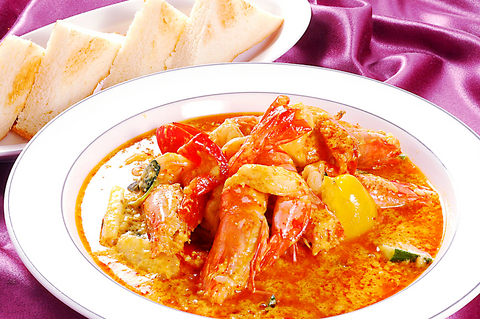It's hard to find anything bad to say about Home's, a stylishly decorated Thai restaurant located directly across from Breeze Center Mall ( "The service is great, the food is great and the portions are good," said Sohail Roshan, a regular customer. Home's quality is further underlined by the fact that it joined an elite group of Thai restaurants last month when it won the Thai Select certificate, a program the Thai government initiated two years ago to promote the country's cuisine abroad. Home's was one of three Taiwanese restaurants to earn this distinction and the only one that is locally owned. "We mix traditional Thai cuisine with modern elements," said owner and manager David Huang (黃正發), who was born in Myanmar and lived in Chiangmai, northern Thailand as a teenager. He chose the name Home's to evoke the image of a place where customers can feel comfortable. PHOTO COURTESY OF HOME'S THAI CUISINE Huang recommends the Thai sauce raw shrimp, the Thai grilled lamb steak and the royal Thai curry prawns. "The Thai sauce raw shrimp really represents Thai cuisine," he said. It consists of eight pealed sashimi shrimp topped with fresh-squeezed lemon juice, diced garlic, fish sauce and grated hot peppers. Each of these elements can be tasted on the first bite, as they burst onto the palette in a cascade of flavors. The lamb steak is marinated for two days before being cut into medallions and served on the bone with a house special red sauce. The flavor is more subtle and the meat is well marbled and of good quality. The curry prawns are Home's house specialty. Served on a bed of red bell peppers with a side of sliced bread, the sauce is made from a mixture of Indian and Thai curries. Chopped peanuts give a contrasting texture to the mildly spicy curry, which has the consistency of melted butter. Wash these down with a glass of Singha beer or Thai tea, a pinkish-orange milk tea with a hint of coffee. The tea goes down smooth and doesn't leave a bitter or sugary aftertaste. With the notable exception of the bread served with the curry prawns, which was a bit sweet, everything else sampled for this review tasted authentic and delicious, which might be because every chef at Home's was hired directly from Thailand.
Thai cuisine found a home in Taipei.

We lay transfixed under our blankets as the silhouettes of manta rays temporarily eclipsed the moon above us, and flickers of shadow at our feet revealed smaller fish darting in and out of the shelter of the sunken ship. Unwilling to close our eyes against this magnificent spectacle, we continued to watch, oohing and aahing, until the darkness and the exhaustion of the day’s events finally caught up with us and we fell into a deep slumber. Falling asleep under 1.5 million gallons of seawater in relative comfort was undoubtedly the highlight of the weekend, but the rest of the tour

Youngdoung Tenzin is living history of modern Tibet. The Chinese government on Dec. 22 last year sanctioned him along with 19 other Canadians who were associated with the Canada Tibet Committee and the Uighur Rights Advocacy Project. A former political chair of the Canadian Tibetan Association of Ontario and community outreach manager for the Canada Tibet Committee, he is now a lecturer and researcher in Environmental Chemistry at the University of Toronto. “I was born into a nomadic Tibetan family in Tibet,” he says. “I came to India in 1999, when I was 11. I even met [His Holiness] the 14th the Dalai

Following the rollercoaster ride of 2025, next year is already shaping up to be dramatic. The ongoing constitutional crises and the nine-in-one local elections are already dominating the landscape. The constitutional crises are the ones to lose sleep over. Though much business is still being conducted, crucial items such as next year’s budget, civil servant pensions and the proposed eight-year NT$1.25 trillion (approx US$40 billion) special defense budget are still being contested. There are, however, two glimmers of hope. One is that the legally contested move by five of the eight grand justices on the Constitutional Court’s ad hoc move

Stepping off the busy through-road at Yongan Market Station, lights flashing, horns honking, I turn down a small side street and into the warm embrace of my favorite hole-in-the-wall gem, the Hoi An Banh Mi shop (越南會安麵包), red flags and yellow lanterns waving outside. “Little sister, we were wondering where you’ve been, we haven’t seen you in ages!” the owners call out with a smile. It’s been seven days. The restaurant is run by Huang Jin-chuan (黃錦泉), who is married to a local, and her little sister Eva, who helps out on weekends, having also moved to New Taipei